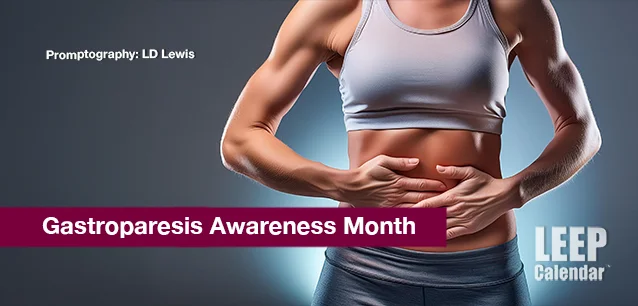 AD
AD
Today is: December 19
Scroll to explore events active on this date.
LEEP INK FEATURES

August? Absolutely!
In August, we live through the Dog Days of Summer. It's hot and often humid, and those who can leave for better climates do. Down south, winter is in full force. August is also known as "the ...

In The Heat of July: July 2025 Events
Is it hot enough (or cold enough if you're below the equator) for you yet? There is actually a day for that! Like every month, I pick a diverse collection of events you may or may not know about. This ...

May Blooms: Events in May 2025
Along with October, May is one of the most densely packed months of the year. It's before the summer humidity and the last whole month of the school year. The weather is warming in t...
About Gastroparesis Awareness Month
Food , United States
Ends: Aug 31, 2024
DESCRIPTION:
GASTROPARESIS AWARENESS MONTH: SHEDDING LIGHT ON A LITTLE-KNOWN CONDITION
Each August, the United States observes Gastroparesis Awareness Month to raise awareness about gastroparesis, a condition that affects the stomach muscles and prevents proper stomach emptying. The International Foundation for Gastrointestinal Disorders (IFFGD), a nonprofit organization dedicated to improving the lives of those affected by gastrointestinal disorders, champions this event.
Gastroparesis Awareness Month is a call to action for the public, medical community, and policymakers. It's a time to deepen our understanding of the challenges faced by individuals with gastroparesis, to support research, and to advocate for better treatments and patient support. Your involvement is crucial in this collective effort.
WHAT IS GASTROPARESIS?
Gastroparesis is a chronic condition in which the stomach cannot empty itself of food in a typical fashion. This delayed gastric emptying is often caused by damage to the vagus nerve, which controls the stomach muscles, or by diseases such as diabetes. Symptoms include nausea, vomiting, feeling full quickly when eating, bloating, and abdominal pain.
The exact cause of gastroparesis is not always clear, but various factors, including diabetes, surgery, infections, and certain medications, can trigger it. It can also be idiopathic, meaning its cause is unknown.
TREATING GASTROPARESIS
Treating gastroparesis involves dietary changes, medications, and sometimes surgical interventions.
Dietary management includes:
Eating smaller, more frequent meals.
Avoiding high-fat and high-fiber foods.
Incorporating easily digestible foods.
Medications such as prokinetics, which helps stimulate stomach muscles, and antiemetics, which controls nausea, can be prescribed. In severe cases, treatments may involve feeding tubes or gastric electrical stimulation, a surgical procedure that uses electrical pulses to encourage stomach contractions.
PREVENTING GASTROPARESIS
Preventing gastroparesis can be challenging since it often results from underlying health conditions like diabetes. Managing diabetes effectively through proper diet, regular exercise, and medications can reduce the risk. For those without diabetes, avoiding medications that can slow gastric emptying, such as certain pain relievers and antidepressants, might help reduce the risk.
Gastroparesis Awareness Month is not just about raising awareness but also about taking action. The IFFGD and other supporting organizations are at the forefront of this fight, advocating for increased funding for gastroparesis research, better diagnostic tools, and more effective treatments. They are here to provide resources and support for patients and their families, helping them navigate the complexities of living with gastroparesis.
As awareness of gastroparesis grows, so does the hope for a brighter future. With increased understanding and support, those affected can look forward to better care and improved quality of life. Ultimately, this awareness can lead to more effective management and treatment options for this challenging condition.
VIDEOS
SUPPORTING DOCUMENTS
Currently, this event does not have supporting documents.
ADDITIONAL IMAGES
Currently, this event does not have supporting images.
Where would you like to go now?
 AD
AD


/footer-logo.svg)
